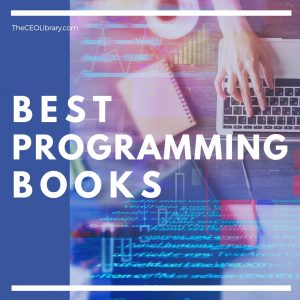Home — Collections — Best Programming Books – For Startup Founders and Entrepreneurs
Best Programming Books – For Startup Founders and Entrepreneurs
Table of Contents
 What books do the best programmers read to stay up-to-date with the latest in the continually changing environment of software development? How do they know which books are really worth their time, and which are nothing more than simple side pleasures?
What books do the best programmers read to stay up-to-date with the latest in the continually changing environment of software development? How do they know which books are really worth their time, and which are nothing more than simple side pleasures?
To some, the best programming books are those that can be easily referenced when they’re stuck in the code. These types of reference materials are, to be certain, some of the most valuable books to have on hand. The internet, however, is often a more easily accessible reference guide in situations like this.
So, what kinds of programming books exist? Beyond reference books, many books help people, like me, understand how programming works at a higher level. Programming is not just about the code, but it is also about what the code creates and how that creation will be used.
Almost anyone can find a snippet of code, copy it, and paste it into place. With luck, it will function properly on its own. Whether or not that code can be created to work with specific intentions will depend on how well the programmer understands the code’s language and syntax.
I’ve found that the best books are those that blend introducing new, concrete knowledge with examples with more abstract ideas that must be addressed while programming.
From foundational books to reference books, from career guidance books to efficiency books, there is a huge variety of content about programming available to programmers who are ready to do more.
Are you one of those programmers? I know I am. Today’s list, though, was not created by me.
It was curated by the ideas, thoughts, and knowledge-base of the amazing CEO Library community. Experienced developers and programmers shared their insight into what are the best programming books, and this is what they recommend:
Best Programming Books

Programming in Scala
I love the following books, even though I don’t code in these languages in a daily basis. It’s still interesting to learn the concepts behind them
- Programming in Scala (Odersky)
- Learn You a Haskell for Great Good

The Tao of Programming

Coders at Work: Reflections on the Craft of Programming

Programming Pearls

Coders: The Making of a New Tribe and the Remaking of the World

JavaScript: The Good Parts

Mastering Bitcoin: Programming the Open Blockchain

The Unix Programming Environment

Smalltalk Best Practice Patterns

Structure and Interpretation of Computer Programs
If my career path is hackers turned business people, I’d say:
Start with the basics and fundamentals:
- SICP: Structure and Interpretation of Computer Programs
- Code Complete 2

Learn Ruby the Hard Way: A Simple and Idiomatic Introduction to the Imaginative World Of Computational Thinking with Code

Learn You a Haskell for Great Good!
I love the following books, even though I don’t code in these languages in a daily basis. It’s still interesting to learn the concepts behind them
- Programming in Scala (Odersky)
- Learn You a Haskell for Great Good

Code Complete: A Practical Handbook of Software Construction
If my career path is hackers turned business people, I’d say:
Start with the basics and fundamentals:
- SICP: Structure and Interpretation of Computer Programs
- Code Complete 2

Hackers & Painters: Big Ideas from the Computer Age

Refactoring: Improving the Design of Existing Code (2nd Edition)
This is next on my list of technical books to read! Refactoring is one of two programming books that I’ve read multiple times (the other is Smalltalk Best Practice Patterns), and I’m due for another reading. What perfect time then to dive into Martin Fowler’s long anticipated 2nd edition, now using JavaScript rather than Java for the code examples.
Like the stoic books, I read Refactoring and that Smalltalk book again and again not because I’m going to learn something new, per se, but because I want to be reminded about what I already know. And what better time to reread than just as we’re kicking off a new major project that needs a fresh architectural foundation.
Also, these two books just remind every time of how much I love the craft of programming. It’s not just having the programs, it’s not just solving problems, it’s simply using my hands and head to program that in and of itself is sublime.

Uncreative Writing: Managing Language in the Digital Age

Digital Minimalism: Choosing a Focused Life in a Noisy World
The unassuming Georgetown computer science professor has become one of this generation’s leading voices on how we can all work more wisely and more deeply. With media consumption continuing to go way up (which, for most of us, means happiness and productivity continue to go way down) and the world becoming noisier every day, this book is an urgent call to action for anyone serious about being in command of their own life. The minimalism movement successfully led millions to opt out of the many possessions we’re told we’re supposed to crave and focus instead on the small number of things that bring the most meaning and value to our lives. The same ideology applies to our online lives. Digital clutter is stressful. We don’t need the constant connectivity, the pages and pages of apps, the incessant scrolling and clicking. New technologies can improve our lives if we know how to best leverage them. This book already helped me break my Facebook addiction—and the first month of the year has been a big improvement for me because of that.

Smart and Gets Things Done: Joel Spolsky’s Concise Guide to Finding the Best Technical Talent

